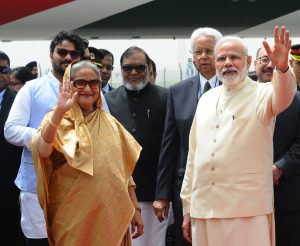Soon after the controversial Citizenship Amendment Act (CAA) was passed in December 2019, a large number of Indians across the country started to protest against it. One of the provisions in the CAA is to give citizenship to persecuted non-Muslims such as Hindus, Sikhs, Jains, Buddhists, Parsis, and Christians from Bangladesh, Pakistan, or Afghanistan, who entered in India on or before December 31, 2014. Protesters say this religious categorization for obtaining citizenship is against the secular character of the Indian Constitution.
More than that, the CAA is not an isolated act; it is hyphenated with the National Register of Citizens (NRC), which is expected to be carried out in all of India, as Union Home Minister Amit Shah has stated from various platforms.
Besides affecting its own citizens, the CAA and NRC will harm India’s relationships with its South Asian neighbors, particularly with Bangladesh and Nepal. When the NRC was carried out in Assam, Bangladesh was the center of the entire debate. The objective of the NRC, as argued by the Union Government of India and the Assam government, was to detect and deport Bangladeshis illegally living in Assam back to Bangladesh. Conversely, Bangladesh’s official stand is that none of its citizens are living illegally in India. According to Dhaka, those who took shelter after the Pakistani Army began unleashing violence on the Bengali-speaking population in what was then East Pakistan had already returned after Bangladesh was liberated in 1971.
Before the NRC process started, in 2014, the Indian Supreme Court asked the Indian government to negotiate the issue with the government of Bangladesh.
Since the NRC exercise started, India has been trying to convince Bangladesh that it is an internal matter. In 2019, a few days before the final NRC list was published, India’s External Affairs Minister S. Jaishankar visited Dhaka, where he reassured the Bangladeshi leaders that the NRC is “an internal matter of India,” about which Bangladesh need not worry. Two months later, during her visit to India in October 2019, Bangladeshi Prime Minister Sheikh Hasina said, “I have spoken with PM Modi and I am satisfied” on the issue of the NRC and deportations.
On deportation, Bangladesh’s Foreign Minister A.K. Abdul Momen said that his country is ready to take back Bangladeshi citizens who entered into India illegally – “if any” — if India provides a list. “But if anybody other than our citizens enter Bangladesh, we will send them back,” Momen added.
Bangladesh’s Foreign Secretary Shahidul Haque, when asked about the statements made by a few Indian leaders on deporting people, said : “This [NRC] is internal matter [of India] and [we] continue to believe in that and I think we shouldn’t make a crisis out of nothing at this stage and we should be able to wait and see.”
The CAA has furthered complicated India-Bangladesh ties. Highlighting the need for the CAA in the parliament, Amit Shah named Bangladesh, along with Pakistan and Afghanistan, as places where he said non-Muslim minorities face persecution. This has not been welcomed by Bangladesh. Soon after the CAA was passed, Momen cancelled his scheduled visit to India. This was followed by the cancellation of Bangladeshi Home Minister Asaduzzaman Khan’s visit and postponement of two meetings on river management between officials from the two countries in New Delhi.
Unlike Shah, Indian Prime Minister Narendra Modi has emphasized the conditions of minorities in Pakistan in particular as the reason he believes the CAA is needed. As India-Pakistan relations are already in a bad phase, Modi’s words will not harm that relationship further.
The other country with which India’s relationship may be affected is Nepal. Unlike Bangladesh, Nepal is a Hindu-majority country so it is not mentioned in the CAA. However, according to media reports, between 70,000 and 100,000 Gurkhas were excluded from the NRC list in Assam. Most of these Gurkhas have their roots in Nepal but came to India at different times. Not only Gurkhas, but people from other ethnic groups with roots in Nepal have adopted India as their country for decades. There are also marital relations between people living along the India-Nepal border.
Nepalis may not be asked outright to go back to Nepal or be put into detention centers; however, exclusion of even some of them from the NRC list would be enough to create a few ripples in India-Nepal relations. Ties are already on shaky ground, particularly after the unofficial blockade along the Indian border in 2015-16, though the government of India has always denied this. India-Nepal bilateral relations were further disturbed after the updated map of India published in November 2019 showed Kalapani in Pithoragarh district of the Indian state of Uttarakhand. Nepal has recorded a strong official protest on this issue.
To conclude, the government of India’s adamant stance on the CAA and NRC will affect its own “neighborhood-first” policy. It has taken years to develop the close relationship with Bangladesh, which may be affected due to the NRC and CAA. And the NRC may further widen the distance between India and Nepal.
Amit Ranjan is a visiting research fellow at the Institute of South Asian Studies, National University of Singapore.
































